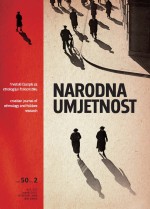Reprezentacija ženske neplodnosti u hrvatskoj tradicijskoj kulturi i književnosti od kraja 19. do početka 21. stoljeća
Representation ofFemale Infertility in Croatian Traditional Culture and Literature from the Late 19th until the Early 21st Century
Author(s): Kornelija Kuvač-LevačićSubject(s): Anthropology
Published by: Institut za etnologiju i folkloristiku
Keywords: infertility; mythical guilt; Croatian traditional culture; Croatian literature; intrapersonal and interpersonal conflict
Summary/Abstract: This paper deals with the way in which the infertility of a married couple was conceptualized in the Croatian traditional culture, which generally related exclusively to the woman’s inability to give birth. The first part deals with anthropological and ethnological research dealing with various aspects of (in)fertility in the family life of the South Slavs. Due to the immense importance of offspring in the life of the entire social community, the phenomenon of infertility is related to folk beliefs and related magic rituals, whose aim was to prevent infertility or make a couple infertile. The second part of the article presents a comparative analysis of three Croatian literary texts. The first two deal with the status of an infertile woman in the rural community of the 19th and the first half of the 20th century, and the third discusses her status in the contemporary Croatian society, where rural and urban influences interweave. The first text was written at the end of the 19th century (Ivan Majstrović, Neplodnica (The infertile woman), 1891), the second one was written in the first half of the 20th century (Mila Miholjević, Zalog (Pledge), 1940), and the third one at the beginning of the 21st century (Julijana Matanović, Požurite, že-ne mo-je (Hurry up, my-wo-men), 2009). Neplodnica deals with the way in which the literary text transposes the ethnographically established fact that infertility causes additional, mythical meanings which the traditional community uses to stigmatize the individual accusing her of magical practices, ending tragically for the protagonists. Zalog uses the motif of infertility to represent the complex system of psychological relations between women in a patriarchal community, additionally isolated by its geographical position, where infertility becomes a cause of intrapersonal and interpersonal conflict. The third story, Požurite, že-ne mo-je, deals with the position of the modern woman within the technologized system of in vitro fertilization and problematizes the still existing social prejudice about women’s mythical guilt over their lack of motherhood. This paper is a literary-anthropological, qualitative study, whose aim is to establish how the traditional view of infertility and its implications – which are evident even in contemporary social communities – are represented in the Croatian literature of the late 19th and early 21st century, and how the authors of the selected texts remove themselves from the conventional social stereotypes through a subversive stance towards them and the critical perspective adopted for the benefit of their reader community.
Journal: Narodna umjetnost - Hrvatski časopis za etnologiju i folkloristiku
- Issue Year: 50/2013
- Issue No: 2
- Page Range: 188-204
- Page Count: 17
- Language: Croatian

